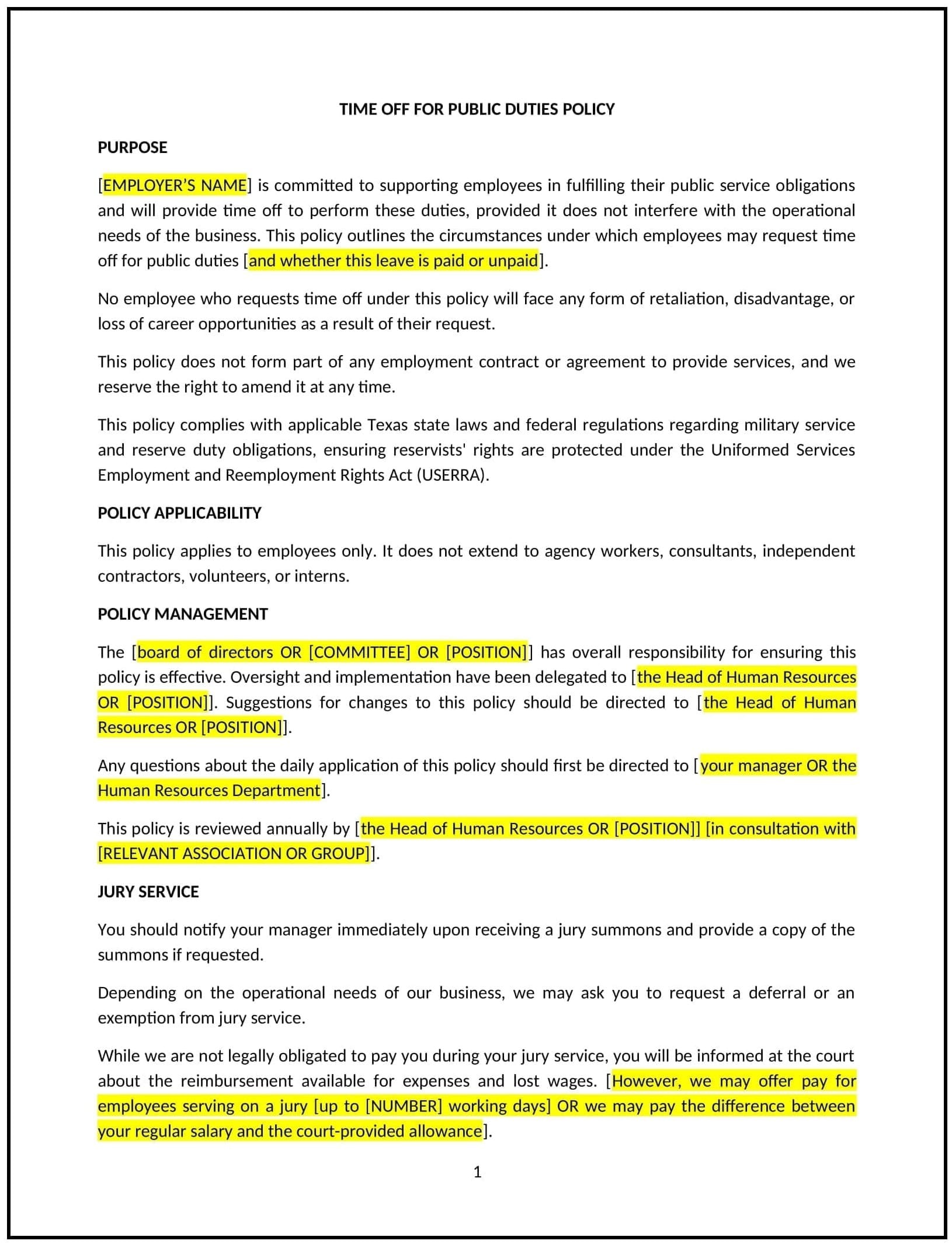Time off for public duties policy (Texas): Free template
Got contracts to review? While you're here for policies, let Cobrief make contract review effortless—start your free review now.

Customize this template for free
Time off for public duties policy (Texas)
This time off for public duties policy is designed to help Texas businesses establish clear guidelines for employees who need to take time off to fulfill public duties, such as jury duty, voting, or serving as a witness in legal proceedings. The policy outlines the process for requesting time off, the compensation provided (if any), and the company’s stance on supporting employees in fulfilling their civic responsibilities.
By adopting this policy, businesses can improve their compliance with Texas state laws regarding time off for public duties, promote employee engagement in civic responsibilities, and maintain business continuity during employee absences.
How to use this time off for public duties policy (Texas)
- Define public duties: Specify the types of public duties that qualify for time off, such as serving on a jury, attending a court hearing as a witness, voting in elections, or other civic responsibilities that require an employee's time during working hours.
- Set notice requirements: Outline the process for employees to request time off for public duties, including the advance notice required, any documentation or proof (e.g., jury summons), and the timeline for submitting the request.
- Clarify compensation policies: Specify whether employees will be paid during their time off for public duties. The policy should outline whether the company provides paid time off, unpaid leave, or if the employee will receive compensation from the government (e.g., jury duty pay).
- Address job protection: Ensure that employees are not penalized or discriminated against for taking time off to fulfill public duties. The policy should clarify that employees will be allowed to return to their regular positions without adverse consequences after fulfilling their duties.
- Determine limits on time off: Define how much time off employees are allowed for public duties, and whether there are any limits to the number of days employees can take off for specific duties, such as jury service.
- Promote civic engagement: Encourage employees to participate in public duties and demonstrate the company’s support for employees’ civic responsibilities while ensuring that the business’s operations continue smoothly.
- Address conflicts with business operations: Provide guidance on how to handle situations where the employee’s absence for public duties may cause a disruption to the business, and how the company will work to accommodate the employee’s absence while maintaining productivity.
Benefits of using this time off for public duties policy (Texas)
This policy offers several benefits for Texas businesses:
- Promotes civic responsibility: By offering time off for public duties, businesses encourage employees to participate in civic responsibilities such as voting, jury duty, and other public services, which can foster a sense of community engagement.
- Enhances legal compliance: By adhering to Texas state laws regarding time off for public duties, businesses reduce the risk of legal penalties or claims related to employee rights and workplace discrimination.
- Reduces absenteeism: The policy ensures that employees can attend to public duties without fear of job loss or retaliation, which can help reduce absenteeism and improve overall employee morale.
- Improves employee satisfaction: Offering time off for public duties can boost employee satisfaction by showing the company’s commitment to supporting its employees' civic responsibilities and work-life balance.
- Enhances company reputation: Businesses that support employees’ participation in public duties are viewed positively by employees, customers, and the community, improving the company’s reputation as a responsible employer.
Tips for using this time off for public duties policy (Texas)
- Communicate the policy clearly: Ensure that all employees are aware of the time off for public duties policy, including the process for requesting time off, the types of duties covered, and any compensation or benefits provided.
- Request timely documentation: Encourage employees to submit documentation, such as a jury summons or voter registration, when requesting time off to ensure that the company can properly track the time off and comply with legal obligations.
- Maintain flexible scheduling: Work with employees to adjust work schedules or find temporary coverage during their absence, ensuring that business operations continue smoothly while employees fulfill their public duties.
- Monitor compliance with legal requirements: Regularly review Texas state laws regarding time off for public duties to ensure that the policy is compliant with any changes in legislation.
- Be supportive and fair: Treat employees equally and fairly when they request time off for public duties, and ensure that no employee faces retaliation or negative consequences for fulfilling their civic responsibilities.